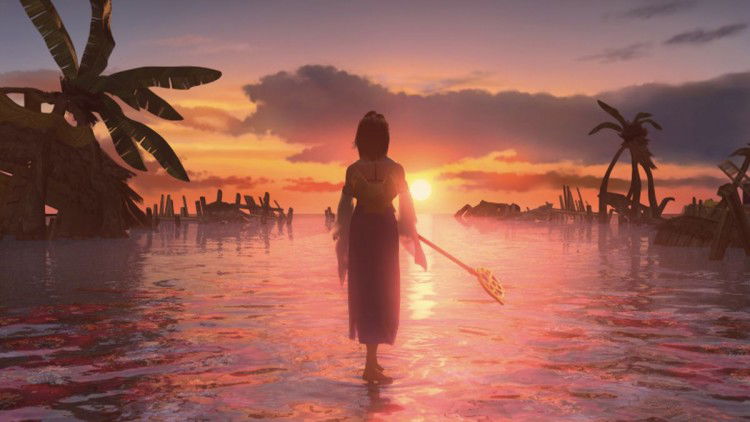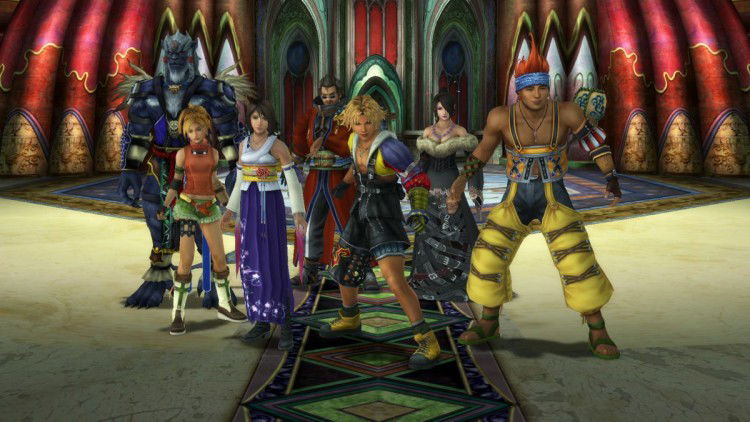Once upon a time in 2001, there was a little ditty on the PS2 called Final Fantasy X. I remember the issue of Gamepro (I think) that featured Auron on the cover, ready for battle with sword and canteen in hand. I remember the excitement I had, having just completed Final Fantasy IX (my favorite entry in the series), and the grand expectations for what the new generation of hardware had in store. I remember popping in that disc, and after a few hours, I remember not being a fan.
I couldn’t quite put my finger on it at first. Battles were fun, even early on when options were in short supply. The combat system of Final Fantasy X may actually be its crowning achievement. Yet, despite the uniqueness of Spira, I never truly felt it was a place, but rather a cardboard background set against the narrow hallways I was running through. Furthermore, the game failed to move me to give a single damn about the whining idiot of a protagonist.
Let me put this in context: Final Fantasy IX opens in the city of Alexandria. Within minutes, the player controls Vivi, a young black mage, on his way to cash in a ticket to the latest theatrical showing in town. However, should you choose, you could easily waste an hour roaming the streets, talking to literally dozens of NPCs, and getting into all sorts of mischief. You could grab a grandmother’s life savings, find a young boy’s cat for him, and play jump rope. All the while, you quickly learn how naive, clumsy, and ultimately, innocent Vivi is as a character from his interactions.
Final Fantasy X starts you in Zanarkand, which ends up being a hallway you run down while fighting enemies (admittedly for cinematic purposes). You then end up on Besaid, which is less an island than a hallway that runs from a beach up to a temple. You can talk with some NPCs, but they’re as bland as their expressionless faces. The only thing to do is keep marching forward, with the odd treasure chest obviously placed on the side of the road. All the while, you get the pleasure of seeing flashbacks to Tidus’ childhood that play out like a bad anime. They try to tackle serious emotional issues, but fall flat and are even laughable at times. The only thing I learn about Tidus in those hours is that I didn’t like him, which isn’t a great start when he is meant to carry the story.
Needless to say, I never finished the game when it came out. I had heard from friends how crazy the narrative became. (SPOILERS) They told me that Tidus was an Aeon, to which I always said I could really care less.
Now, let’s take a leap forward in time to the present. With Final Fantasy IX announced for PC release, which hopefully means a console port in the near future, I’ve been looking to scratch that JRPG itch. It just so happens that I have a copy of the Final Fantasy X/X-2 Remaster, so I said, “Why the hell not?”
It has been fifteen years since I touched this game, but I must say, my opinion has changed greatly in the past week, as I’ve progressed farther than I ever did back when it released. I still don’t love it like I hoped I would in 2001, but I’ve come to appreciate some things more than I once did.
Some of that could possibly be attributed to what has come since. The encroachment of over-stylized anime cyberpunk in Final Fantasy, epitomized by the XIII trilogy, has caused me to appreciate the setting of Spira far more than I once did. While I still find the early game ridiculously restrictive, it does open up, and far sooner than it did for the original XIII (not an excuse for either title, but still). Furthermore, accepting that X would not be one of the more traditional fantasy settings of the Sakaguchi era has also allowed me to appreciate some of the finer elements of the art design.
The battle system, of course, has always been enjoyable. But it is only now that I have truly come to understand the depth behind the Sphere Grid system of progression. It may have been because I was so used to the standard classes of old (and still prefer it as a means of forcing the player to optimize and strategize), but I can now appreciate why many adore it.
While I still hate Tidus, and I find the relationship between him and Yuna to be as forced and awkward as a bad anime trope, there are some thematic elements to the game that I find more interesting. Much of it probably has to do with the fact that, in 2001, these elements went over my head completely. However, as a full-grown adult, I’ve come to find what is going on in the greater world of Spira to be far more interesting than Tidus teaching Yuna how to whistle. The whole game is about a deceptive religious institution trying to destroy the world for no other reason than the sake of continuity. For the love of God (see what I did there), why wasn’t more emphasis placed on this over Tidus’ daddy issues? The fact that these guys can essentially continue to live forever, when unsent, means they can continue to manipulate the people of Spira forever in an endless cycle of death. That’s fairly diabolical, and yet when you learn these things in the game, it seems almost like a side note. The party talks about how Yuna’s faith is broken, something that should warrant a good character moment, but ten seconds later she’s making out with Tidus in a pond.
Regardless of how these plot points were presented, the fact that they exist have allowed me to respect the title a bit more, and they are keeping me engaged enough to keep going with my play through. In fact, overall, I’ve been a lot more excited when sitting down to play this game than I have been about Final Fantasy in a while. I guess, at this point, I’m ready to say it: I forgive you Final Fantasy X. I forgive you for letting me down all of those years ago. While I won’t say you are a great game, I can better recognize what you did right and say you are a good game.
What does this mean for gaming as a whole? Perhaps it goes to show that art is never static. In fact, anything subjective is always relative to time and place. That’s what makes it timeless: it can always be interpreted in new ways by different people. As this industry grows older, it would do many newcomers good to look back at gaming’s roots to gain perspective, but it is equally important that those of us who have been around a while occasionally take a look back as well to refresh our memories and refresh our opinions.



